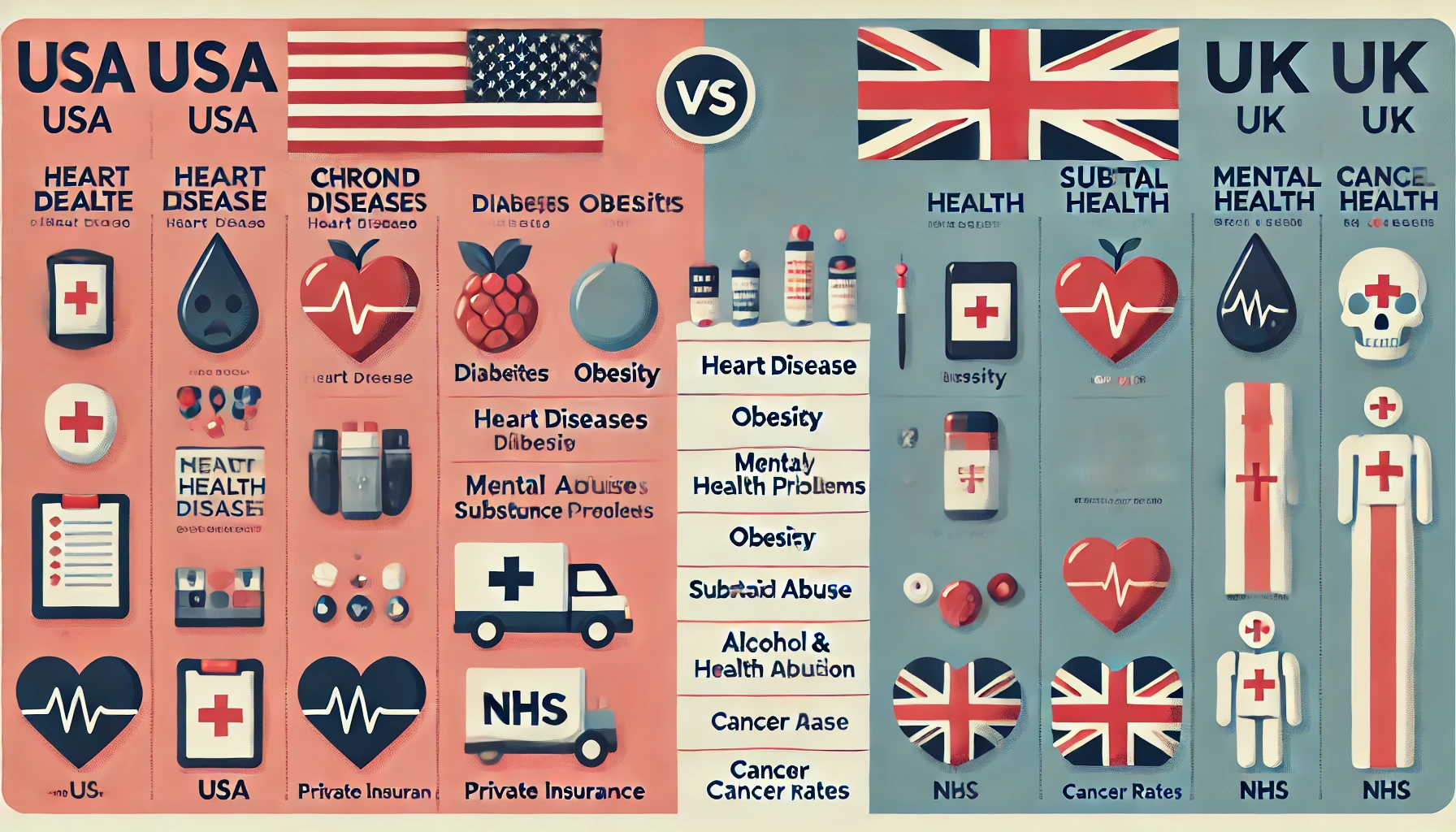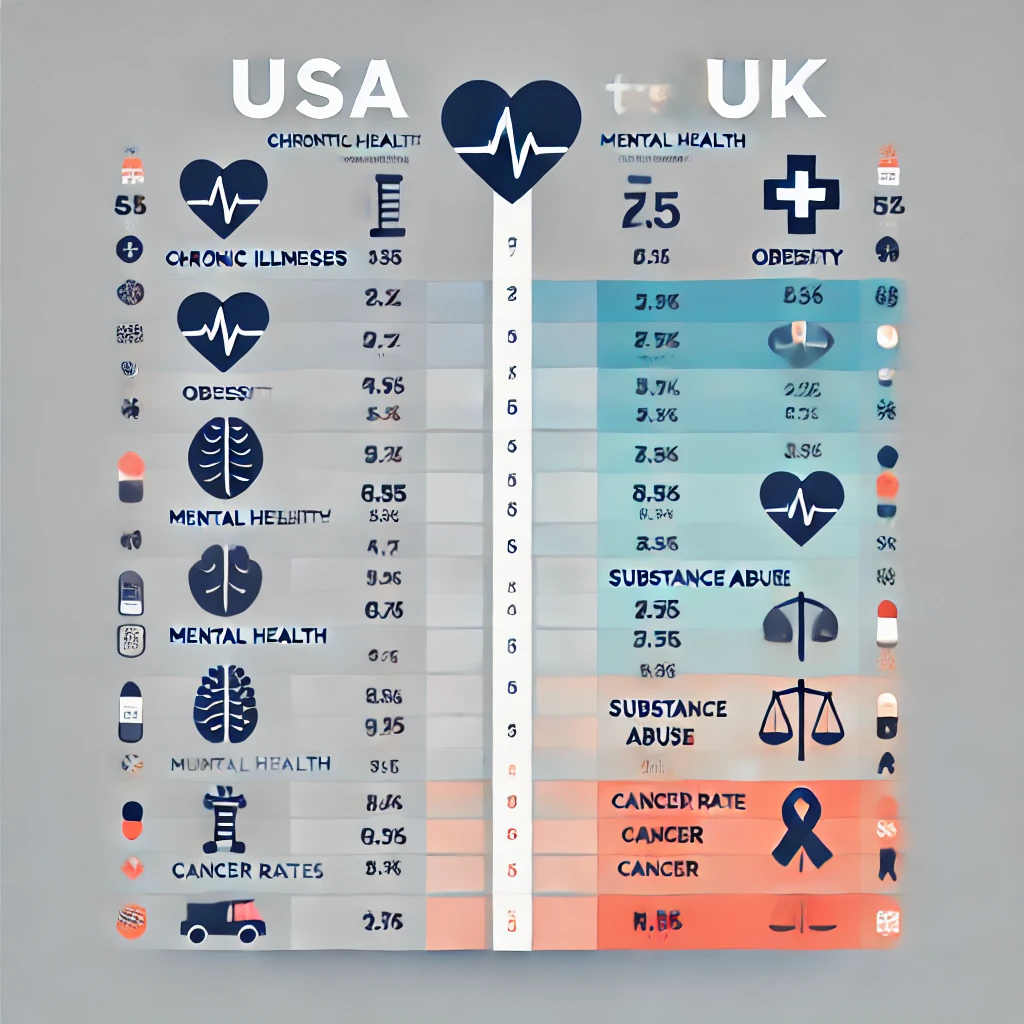
Health issues have always been a focal point for governments, especially in highly developed nations like the USA and UK. While these countries boast some of the world’s most advanced healthcare systems, they are both grappling with a range of health challenges that reflect the complexities of modern life. From chronic illnesses to mental health crises, understanding the health issues in the USA and UK requires a deep dive into not just their similarities but also their differences.
In this article, we’ll explore the major health problems in both countries, uncover the emotional toll on their populations, and shine a light on what we can do to combat these pressing concerns.
Table of Contents
Rising Chronic Illnesses
One of the biggest challenges in both the USA and UK is the increasing prevalence of chronic illnesses. Conditions like heart disease, diabetes, and cancer are affecting millions, with lifestyle factors like poor diet, lack of exercise, and stress playing major roles.
In the USA, heart disease remains the leading cause of death, claiming over 600,000 lives annually. Similarly, the UK is experiencing a surge in cardiovascular issues, with around 7.6 million people living with heart disease.
Why is this happening?
Modern lifestyles in both countries are a double-edged sword. With fast food being more accessible than ever, and many jobs being sedentary, the chances of developing these diseases skyrocket. Stress, a growing issue tied to work and social pressures, further exacerbates these problems. The emotional burden of living with chronic diseases also weighs heavily on both individuals and their families.
Obesity Epidemic: A Shared Struggle
Obesity has become a critical issue in both nations, often acting as a precursor to several other health problems. In the USA, over 40% of adults are classified as obese, while the UK is not far behind, with around 28% of adults in the same category.
The impact of obesity isn’t just physical—it takes a mental toll as well. People suffering from obesity are more likely to experience depression and low self-esteem, which in turn can make lifestyle changes even harder to implement. It’s a vicious cycle that affects people across all age groups.
Solutions on the horizon?
Governments and health organizations are pouring resources into public health campaigns aimed at encouraging healthier eating and more active lifestyles. However, there’s a long way to go before we see significant change.

Mental Health Crisis: A Growing Epidemic
Both the USA and the UK are witnessing a mental health crisis. In the USA, about 1 in 5 adults experience some form of mental illness each year, with depression, anxiety, and bipolar disorder being the most common. The UK is also struggling, with reports indicating that 1 in 4 people will experience a mental health issue at some point in their lives.
What’s driving this crisis?
While there are many contributing factors, rising levels of stress and uncertainty play a big role. Economic instability, social media pressures, and the fast pace of life have created a perfect storm for mental health issues to thrive. For many, the stigma around mental health still prevents them from seeking help, further deepening the crisis.
Governments in both countries are now focusing on improving mental health services. In the UK, the National Health Service (NHS) has ramped up its mental health support programs, while the USA is investing more in community mental health initiatives. However, the question remains: will these interventions be enough?
Here’s a simplified table summarizing the key health issues in the USA and UK:
| Health Issue | USA | UK |
|---|---|---|
| Chronic Illnesses | Heart disease, diabetes, cancer | Heart disease, cancer |
| Obesity | 40% of adults are obese | 28% of adults are obese |
| Mental Health | 1 in 5 adults with mental illness annually | 1 in 4 people experience mental health issues |
| Substance Abuse | Opioid crisis, rising overdose deaths | Alcohol and drug addiction, especially among youth |
| Cancer Rates | 1.9 million new cases expected in 2024 | 375,000 new cases annually |
| Healthcare System | Private, insurance-dependent | Public, NHS provides free care but faces delays |
Substance Abuse and Opioid Crisis
Substance abuse is another area where both the USA and UK are facing serious issues, though the scale of the crisis is larger in the USA. The opioid epidemic, which started in the late 1990s, has claimed hundreds of thousands of lives in the USA, where overdose deaths have surged in recent years. The UK is also dealing with its own drug problems, with increasing rates of alcohol and drug addiction, particularly among young people.
Why is this happening?
For many, addiction begins as a way to cope with stress, anxiety, or chronic pain. In the USA, the easy availability of prescription painkillers fueled the opioid epidemic, whereas in the UK, social drinking culture often leads to alcohol dependence. Sadly, the stigma around addiction prevents many from getting the help they need.
Cancer Rates: A Universal Threat
Cancer continues to be a leading cause of death in both countries. In the USA, about 1.9 million new cancer cases are expected in 2024, with lung, breast, and prostate cancers being the most common. The UK isn’t far behind, with an estimated 375,000 new cancer cases annually.
Why is cancer so prevalent?
Aging populations, poor lifestyle choices, and environmental factors contribute to the rising cancer rates. However, advances in treatment and early detection have improved survival rates, offering hope to many.
Healthcare Access: A Tale of Two Systems
One of the stark differences between the USA and the UK is their healthcare systems. The USA operates largely under a private healthcare model, where access to care often depends on insurance coverage, while the UK has the NHS, which provides free healthcare at the point of use.
Impact on public health?
In the USA, those without insurance often delay seeking medical help, which can worsen outcomes for chronic diseases and mental health conditions. The UK’s NHS, while accessible, faces its own challenges, including long waiting times and underfunding, which can make it difficult for patients to receive timely care.

What Can We Do?
While the health issues in the USA and UK may seem overwhelming, there are steps we can take both as individuals and as societies to improve overall well-being:
- Prioritize Physical Activity: Making small changes, like walking more or incorporating regular exercise into daily routines, can have a significant impact on heart health and weight management.
- Mental Health Matters: It’s crucial to prioritize mental well-being by seeking help when needed, practicing mindfulness, and fostering supportive relationships. Governments must continue destigmatizing mental health and ensuring accessible services for all.
- Healthy Eating: A balanced diet rich in fruits, vegetables, and whole grains can help combat obesity and reduce the risk of chronic diseases.
- Public Health Initiatives: Both governments should focus on public health campaigns and invest in preventive care measures to address these health concerns before they become critical.
Conclusion
Health issues in the USA and UK reflect both the promises and pitfalls of modern life. While both nations face similar challenges like chronic illnesses, obesity, and mental health crises, their healthcare systems and societal approaches differ. By fostering healthier lifestyles, encouraging mental wellness, and improving healthcare access, both nations can combat the health problems that continue to affect millions of lives.
Ultimately, the future of health in these two countries lies in a combination of individual responsibility and governmental support. Together, we can build healthier communities and create a future where well-being is not just a goal, but a reality.





